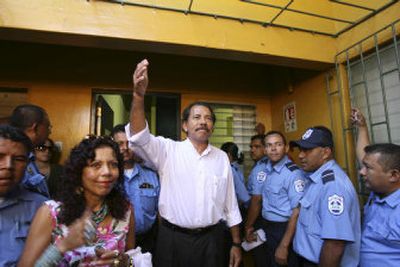Nicaragua elections peaceful

MANAGUA, Nicaragua – Armed with chairs, umbrellas and unyielding determination, Nicaraguans turned out in massive numbers Sunday under a blistering sun and sporadic rain to vote in the most competitive presidential race in the country’s history.
Preliminary results were not expected until late at night, but polls have shown leftist Sandinista leader Daniel Ortega closer than ever to regaining the power he wielded for a decade after guerrillas toppled the Somoza dictatorship and battled Contra fighters financed by the Reagan administration.
The other four candidates seeking to replace President Enrique Bolanos include U.S.-educated banker Eduardo Montealegre, who was just behind Ortega in the polls, a right-of-center coffee grower and two dissident Sandinistas.
Although Ortega has said that his policies have moderated since he was a young Marxist revolutionary, U.S. officials have noted his friendship with Cuba’s Fidel Castro and Venezuela’s leftist President Hugo Chavez, and warned of a possible cut in aid and remittances from Nicaraguans living in the United States should he win.
Chavez has provided discounted oil and fertilizers to Sandinista-dominated groups in what has been portrayed as a blatant effort to support Ortega’s candidacy and add to the left’s gains in Latin American elections this year.
“The country is facing a crucial decision: liberty or oppression,” said Montealegre supporter Marisol Castellon de Zamora, a psychologist. “I want professionals as well as the poor to have the ability to improve their lives.”
The top candidate must obtain at least 35 percent of the vote and a 5-point margin over the second-place finisher to avoid a runoff. If Ortega does not win the first round, polls show he is likely to lose in the runoff in December if his now-divided opponents unite in favor of the other candidate.
No serious irregularities were reported, though many polling places opened up late. The overall mood was calm and streets were quiet as some 17,000 national and international observers, including former President Jimmy Carter, watched over the balloting.
An estimated 80 percent of the country’s 3.6 million registered voters turned out to cast ballots in what many viewed as a weapon to address desperate needs in Central America’s poorest nation: widespread poverty, high unemployment, lack of access to health care and education, official corruption and chronic power outages.
“The situation has to change because the population can’t take much more,” said Irena Artola, 33. “We need jobs and education.”